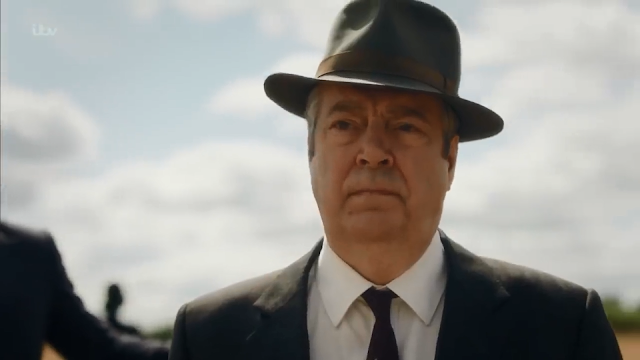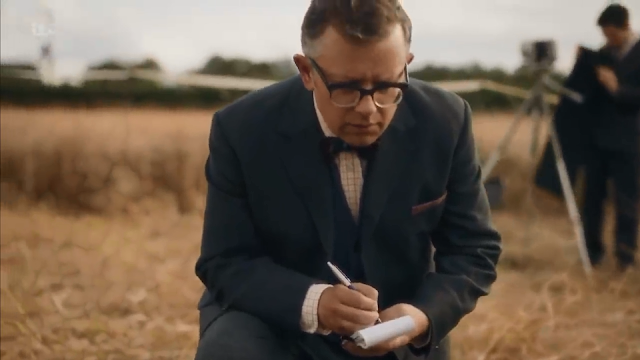My review of the previous season finale: Icarus.
There's a certain ineffable quality about Endeavour. I always feel like I've visited a far-off country when I return to the series, regardless of my critiques of individual episodes (this is me obliquely referring to my grumpy review of last season's finale). Why is that? There's a good dollop of nostalgia, certainly, as this episode's beginning demonstrates (C.S. Bright stars in a re-creation of a classic British road-crossing PSA). But there's also an air of lost grandeur - a Brideshead Revisited wistfulness which laments changing institutions and lost innocence.
Both Inspector Morse and Endeavour are full of that emotion. Pylon is as well, though it ultimately tries too hard to be too many things to fully cohere as a story. Nevertheless, it's another fresh start for the show, and it reminded me anew the reasons to appreciate it.
I'll get into those later in this review. First, we need to talk about the Morsestache.
This is my face, when I contemplate the Morsestache. I received two concerned DMs from friends when they first beheld the Morsestache. Together with Jeeves, we are united in dislike of this upper lip development. We feel betrayed. Please do not bother us at this difficult time.
All right, now I've gotten that off my chest, let's talk about this episode, which is Endeavour meets Alice in Wonderland. Morse - who's been transferred from plain-clothes to uniform - investigates the death and disappearances of several young girls.The rest of the Cowley gang have been scattered to the four winds. Jim Strange is on the path to promotion. A demoted Fred Thursday is working for a smarmy, corrupt boss, D.C.I. Ronnie Box (you might remember him from Passenger). Bright is consigned to the traffic division and barely plays a role in the story. Joan is working with Viv Wall as a trainee with "the welfare" which brings her into direct conflict with her father, who's losing his own sense of who he is. So's Morse. "In disguise, or hiding from someone?" asks Joan of the uniformed Endeavour. "You don't look like you."
Oh, and Max DeBryn is fine. He's got a garden. He cooks. He drinks a lot.
The search to find Fancy's killer has been shuffled to the side as Morse and Thursday both think there's no point fighting The Man. Instead, Fancy's case is championed by that noted scofflaw and anti-heroic rebel....checks notes...Jim Strange? It's a bit of a bizarre character choice which seems more driven by the need for Strange to play a role in the plot than any deductions from his true worldview.
But the overall theme of the episode is the characters' journey from disillusionment to renewed purpose. I think. It's hard to tell in the pretty tangled story.
In what I thought, at first, was an appearance of Tír na nÓg, Morse follows a runaway horse into a field to find the body of a young girl, arranged with flowers. It's Ann Kirby, who went missing some time earlier. When another girl, Rosie Johnson, disappears, the police decide they're probably dealing with a pedophile. There's discussion of a cold case from a few years before regarding a third disappearance - that of schoolgirl Emily Bayard.
A variety of Likely Pervert Stereotypes cycle through the suspect list. There's a priest who talks vaguely about things he feels guilty about. "We all have our doubts," says the vicar, which sparks Morse's suspicion, but should really have alerted him to the Themes. And then another "Known Pervert," Gilbert Sipkin, who turns up just long enough for Fred Thursday to beat the stuffing out of him.
There's a very friendly farmer, Alfie Skynner, with a wife, Maggie, and child, Laurel. Also a mentally ill man, Stanley Clemence, whose mother was murdered years before. He was rescued from the scene by a younger Fred Thursday. Stanley's father, Phil, was hanged for the crime, even though he was probably set up by Fred's old bag-man, D.S. Lott (who got around).
The next suspect is Tingwell, who owned the runaway horse and used to be friends with Phil Clemence. Then there's a school photographer, Ernest Croglin, who sadly remembers Ann Kirby as "my li'l bookworm" (he's played by Barry from Last of the Summer Wine). And then Dr. Lester Sheridan is an effete photographer who keeps copies of Lewis Carroll's "Alice photographs" around. As one does. "That's art!" he complains.
The specifics of the plot aren't particularly important - they're resolved in the usual far-fetched way (though it's unusual that no one suspects the first death could have been an accident). But they do result in Fred and Morse inching back towards each other. Morse hides some evidence to protect Thursday's reputation. And Thursday starts talking to Morse again. For some reason Thursday had been giving Morse the cold shoulder, probably because Thursday's still blaming himself for what happened to Fancy, and for how he's slowly slipping off the pedestal where Morse sets him.
 |
| The Morsestache |
I do wish this episode did more to set up what the overarching concerns of the season will be (it hints at them, but doesn't foreshadow anything in particular), however since series 5 probably took on too many plots and didn't stick around to resolve them, maybe that's for the best. Like I said, I'm reminded of why I love the show - I'd really missed these familiar faces and characters. The mood of the thing remains achingly sad and nostalgic and comforting. For all its flaws, there's no show quite like it.
My review of the next episode: Apollo.
Notes:
- I've not found a place to mention in the review, but the cinematography's really excellent in this one.
- Max DeBryn: "Well, something has to be lovely. Doesn't it." Russell Lewis so good at these little character asides.
- The scene where Morse finds the body also immediately brought to mind the scene where Morse and Lewis are standing in a wheat field in Who Killed Harry Field?
- Here's a classic British road-crossing PSA that may be what inspired PELICON. But my favorite classic British road-crossing PSA stars a very chipper Jon Pertwee.
Series 1
Series 2
Series 3
Series 4
Series 5
If you enjoyed this article, check out my full list of detective reviews.
Longish




Love your reviews, keep up the good work!
ReplyDeleteYour reviews are excellent, thank you!
ReplyDelete::welcomes self back into your reviews now that PBS has caught up::
ReplyDeleteMy biggest nitpick with the episode, as with many previous ones, is that they seem determined to pack an Obligatory Summer Of Love Hippie Commune Carnaby Street Swingin' Helter Skelter Written On The Wall scene, if not a complete plot or subplot, into every episode. It added little; I'd rather have had PBS go with the sounds-delightful Max scene that I think they cut in favor of that.
But if we didn't have that, however would we know it was the 1960s?
DeleteI understand this delightfully trippy sequence was cut down in the PBS version as well (losing the song): https://www.youtube.com/watch?v=jUNi0BN9oAM
It is really a shame that the scene with Max was cut. It was a lovely moment.
Does Endeavour still have the same writers? Am finding this new series more like Midsomer Murders with unbelievable plot lines, too many suspects, some cringeworthy dialogue, disappointing denouements.The stellar cast is being let down by this fall in quality.
ReplyDeleteEvery episode of Endeavour has been written by the same man, Russell Lewis. If Pylon is a bit on the functional side, though, don't worry - the rest of the season gets better. Apollo is fantastic.
DeleteI'm assuming you noticed the poster in the police headquarters announcing the retirement of "Insp. C. Dexter" (with his photo) about 10 minutes from the ending of the recorded PBS episode. Thank you for the review that articulates the impact of the writing. I love it when a stranger can explain my feelings.
ReplyDeleteHey, folks and loyal PBS viewers and supporters.
ReplyDeleteDidja know PBS edits about 15 minutes from every Endeavour episode? So much for "the impact of the writing", eh?
All those clunky transitions and garbled inter-personal communications (is that what it's called nowadays?), all inexplicable? Yeah, Darlene Shiley and crew cut it out. You probably wanted to see the scene betwixt Morse and Joan, while both visit the collapse victims in the hospital - uh huh, inter-personal, that was!
But PBS says no, so tough darts, must maintain Morses's rep as an inconsiderate dolt, I suppose that was the decision. Gotta do fund-raising, too, don't we?
Try https://www.springfieldspringfield.co.uk/view_episode_scripts.php?tv-show=endeavour-2013&episode=s06e04 to see all you missed.
Frikkin' disgraceful.
Dear Hannah, It has been a long time since the last series, hasn't it? I felt exactly the same way you did upon opening the Endeavour portal and stepping into its world again. And it is a world all unto its own, for sure. You are spot on about the general feeling of wistfulness that hangs heavy over the series.
ReplyDeleteAs always, I enjoy reading your reviews and critiques of the episodes.
Thanks for reading!
DeleteI just watched this episode again after 3 years perhaps? Your summation of the feeling is just right: Like I said, I'm reminded of why I love the show - I'd really missed these familiar faces and characters. The mood of the thing remains achingly sad and nostalgic and comforting.
ReplyDelete